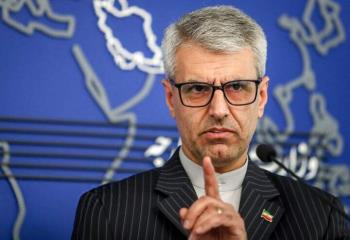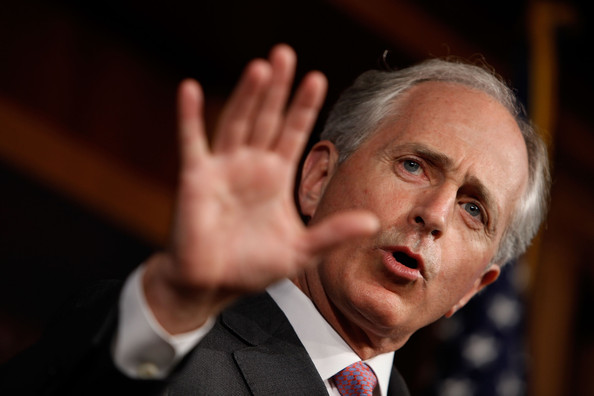Alwaght- The Times Magazine reported, according to well-informed sources, that during the visit of seven members of the American Senate to the Zionist entity in January, the Prime Minister of the Israeli entity Benjamin Netanyahu rejected their proposal. The proposal involved holding an explanatory meeting by the Mossad for the Senate members regarding the nuclear negotiations with Iran. However, after Bob Corker, the Republican Chairman of the Foreign Relations Committee in the U.S. Senate - who doesn’t favor the introduction of additional sanctions on Iran, warned to leave the Zionist Entity, Netanyahu ordered the convening of the meeting.
According to the report, during his visit to the Israeli Entity two months ago, Bob Corker asked for a demonstration meeting to be held by the Mossad with the members of the Senate regarding the nuclear negotiations. However, Netanyahu's office denied the proposal due to the damages that might occur to the nuclear negotiations.
Corker resented the decision of the Prime Minister's office of the Israeli Entity. He threatened that he would leave the Zionist Entity in case such meeting was not convened. Finally, with the intervention of the Ambassador of the Israeli Entity in the United States, Ronald Dermer, Netanyahu agreed to hold this meeting.
The meeting was attended by the members of the Senate: the Republicans Bob Corker, John McCain, Lindsey Graham, John Barrasso; and the Democrats Tim Kaine, Joe Donnelly; and the Independent Senate Angus King.
The director of the Mossad, Tamir Pardo, said during the meeting of U.S. Senate members, "the joint plan of the Senator Sam Menendez and Mark Kirk is likely to pose a serious blow to the negotiations, and render the ongoing 16-months-negotiations and the preliminary Geneva agreement ineffective." He compared the imposition of new sanctions against Iran by throwing a hand grenade at the negotiating table.
Following the report, Pardo's office issued that he "used this expression as a metaphor to describe the possibility of creating a temporary crisis in the negotiations at the end of which talks would resume under improved conditions .”
Pardo “emphasized in the meeting [with US lawmakers in January] that the exceptional effectiveness of the sanctions imposed on Iran in recent years are what brought Iran to the negotiating table."
According to this report, Pardo explained to the Senate members the destructive nature of the new sanctions against Iran at a time when the negotiations are being carried between Iran and the Group 5+1. As a result, the Senator Corker issued his new plan by modifying Kirk-Menendez initial plan and taking this observation into consideration.
Based on Kirk's plan, the new sanctions will be applied only in case the Islamic Republic of Iran fails to fill its obligations imposed by the preliminary Geneva November 13th Agreement.
According to The Times' report, Senator Kirk needs detailed and accurate information regarding the negotiations and the preliminary Geneva Agreement, in order to lay down a new plan concerning Iran. This is why he requested a demonstrative meeting with the Mossad, since it seems that Obama's administration refuses to provide information to the Senate based on the confidentiality of the negotiation process.
Moreover, based on the agreement between Iran and Group 5+1, the provisions of the negotiations are confidential, and it is prohibited for the participating countries to publish or leak news related to the negotiations' content.
In conjunction, White House Chief of Staff, Denis McDonough, issued a warning message to Senator Kirk not approving the new plan against Iran, requesting him to refrain from proceeding until the ongoing negotiations reach results.
In this message, the White House reiterates the threat of using the Veto against any new plan by the Congress, before the negotiations reach possible results.
On the other hand, U.S. Secretary of State, John Kerry, told CBS News on Saturday that if the Islamic Republic of Iran "can show that its nuclear program is intended for peaceful purposes," then it is "possible to reach an interim political deal in the next days." The deal includes easing the sanctions against Iran, if it curbs its sensitive nuclear activities for at least ten years.
He said, "We believe very much that there's not anything that's going to change in April or May or June that suggests that at that time a decision you can't make now will be made then." He added, "If it's peaceful, let's get it done. And my hope is that in the next days that will be possible."
Kerry is to meet with his Iranian Counterpart, Mohammad Jawad Zarif, in Switzerland on Sunday.
Moreover, John Kerry rejected the letter written by 47 Republican Senators as a "direct interference." The letter threatens that once Obama leaves office, any nuclear deal with the Islamic Republic will be pulled.
The negotiations are to continue in Switzerland next week. According to reports, the agreement would allow Iran to develop a civilian nuclear program under strict supervision, which renders building of a nuclear weapon difficult.



























